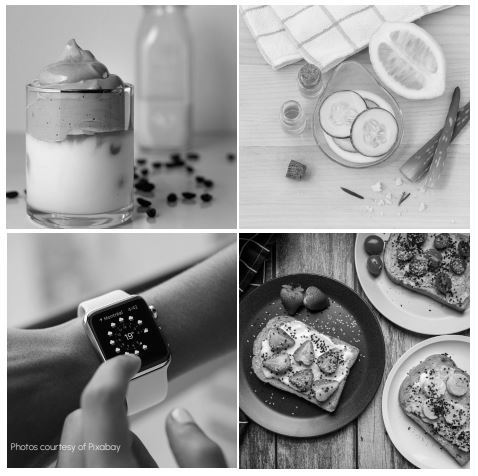IS IT WORTH IT TO BE THAT GIRL?
The harmful effects of the popular Tiktok trend, that girl

Photo courtesy of Pixabay
November 22, 2021
She wakes up early, eats healthy smoothie bowls, exercises, meditates, studies, and cleans her room all before 8 a.m. and she does this while looking immaculately beautiful and skinny. Who is she? She’s That Girl, a TikTok trend where people either show off or try to become the best version of themselves.
Throughout quarantine, many people took it upon themselves to try and change themselves for the better. For some this meant waking up earlier, being cleaner, or eating healthier, but on TikTok, self-improvement became something of a sport with people competing to see who’s life can look the most perfect and polished in just 60 seconds. The women who achieved this became known as “That Girl,” the girl who has her life together.
For some, being that girl is an aspirational goal, while for others she represents a greater problem with American “hustle culture,” mental health shaming, and unachievable Eurocentric beauty. A Twitter user named Dahyuni expressed her experience with the trend and tweeted, “all that the that girl trend did to me is give me an eating disorder and made me hate my life.”
So, what exactly is wrong with this trend? First, it’s important to understand hustle culture. In America, there is an emphasis on constant productivity that demands results regardless of how the worker feels.
Maize Magazine phrases it best: “Any chance of self-fulfillment depends on the grind and personal sacrifice. And the hustler has to sacrifice a lot, almost everything. They have no personal life, they barely enjoy anything. Their days are a long list of chores and choices all geared towards career advancement.”
That girl exemplifies hustle culture. One of the keystones of that girl is her productivity. She spends her entire morning being productive: working out, cleaning, writing daily goals, and meditating to focus on becoming more successful.
If that girl happens to be a student, then her routine may also consist of writing immaculate notes for her classes and doing homework in a quick and timely manner. This can be especially harmful because hustle culture is a major problem for high school students. Many teens study hard without taking any breaks and are celebrated for it, despite the potential damages to their mental health.
That girl tricks us into believing that having our life together means becoming enslaved to the hustle culture that already plagues millions of Americans every day, even though not everyone can devote themselves to such a life. Not just because they don’t want to, but because it can be difficult. According to the CDC 1 in 3 high school students have experienced feelings akin to depression, which can heavily affect productivity.
A study was published in 2011 by Annals of Family Medicine, a peer-reviewed medical journal, titled “Severity of Depression and Magnitude of Productivity Loss.” The study concluded that there is a relationship between the severity of depression and the ability to work, and suggests that even minor symptoms of depression can affect overall productivity.
Unfortunately, most people don’t consider this when it comes to productivity, thus the term, “mental health shaming.” Mental illness is not as visible as other impairments, meaning mental illness is commonly misunderstood. The rampant misunderstanding of mental illnesses, such as depression, leads to assumptions and stigmas surrounding people who deal with mental illness.
As previously established, depression can lead to a decrease in productivity. This lack of productivity often leads to the stereotype that depressed individuals are “lazy” or “unmotivated.” These words can also lead to victims feeling something called productivity shame.
Productivity shame is the result of hustle culture and affects more than those who are mentally ill. Shift Blog defines productivity shame as “a feeling we get from not doing enough, often because we have no clear standards for enough. It’s the guilt you get for taking a nap, watching too much TV or relaxing, because you could be doing something more productive.” But this feeling can also be inflicted on others meaning many people feel this way simply for living their lives.
When you look at that girl on social media, you are very likely to feel productivity shame. Several studies have been done showing that repeated social media viewing can result in depression, anxiety, and other negative feelings. In the case of viewing that girl, the bad feelings are likely to be productivity shame.
However, at the end of the day, these feelings are pointless because it is impossible for anyone, especially a teenager, to be that girl.
First, it requires a certain financial status to be that girl. Time is money and not everyone has a lot to spend on meditating while writing their goals in an aesthetic bullet journal. Some people have jobs and can’t waste their time on these things. There are also people who simply can’t afford to live like that girl.
That girl uses expensive skincare and makeup products. She wears Lululemon leggings which can cost up to $100. She exclusively drinks homemade ice coffee and purified water. The harsh reality is, however, most people can’t afford to live this way.
On average, a healthy diet costs $1.77 more than having an unhealthy diet. Those numbers add up and create a serious problem where many people can’t afford to eat healthy all the time.
Speaking of eating, that girl doesn’t really do it. If you look at any that girl video, she seems to eat plain avocado toast, small smoothie bowls, salads or yogurt and only that. This is harmful because it promotes under-eating. This obsession with under eating healthy foods is called orthorexia. It’s an eating disorder where an individual has an unhealthy focus on healthy eating. Obviously, not every person who does this trend suffers from orthorexia, but when every person participating in the trend is conventionally attractive it can seem really appealing. It isn’t really a stretch to say that a person can develop an eating disorder after being bombarded with beautiful women who receive praise for undereating and constant exercise.
Now, it is important to know that wanting to improve yourself or living a that girl lifestyle isn’t inherently a bad thing, but when that lifestyle is held up as the ideal, it can be extremely harmful because of its promotion of hustle culture, mental health shaming, and an unhealthy standard of beauty.
Remember, it’s ok to improve yourself at your own pace and in a way that is beneficial to you. Reaching out on social media for advice is perfectly fine, but don’t attempt to model your life after another’s.

